The statistical warning signs about obesity and overweight rates for American children have been scaring health providers and educators for three decades now, but little has improved in recent years. Since the mid-1980s when tracking of body mass index (BMI) numbers began, obesity rates have doubled for children and quadrupled for teens. If those stats aren’t sobering enough, here’s one more:
More than one-third of children or adolescents are either overweight or obese in this country and those children are more likely to remain overweight or obese as adults, putting them at higher risk for heart disease, Type 2 diabetes, hypertension, asthma, and some cancers.
Three Hope professors, though, are doing their part to help reverse the girth of our nation.
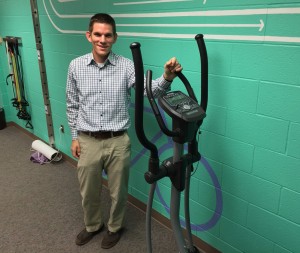
“Foundations of Fitness,” a multidisciplinary program that provides Holland area families with age-appropriate structured exercise and lifestyle education, is a Hope College-based childhood wellness endeavor led by Dr. Kyle Morrison, assistant professor of kinesiology, with the assistance of Dr. Steven Smith and Dr. Mark Northuis, both professors of kinesiology. The program started in the fall of 2014 to help reduce childhood obesity and overweight percentages locally and has been funded with about $250,000 in grants from Herman Miller Cares over its two-year lifetime.
Working with 20 different families on average over 10-week periods each semester and summer, Morrison and his colleagues use exercise and education toward instilling the benefits of a healthier lifestyle upon those involved. Children ages 5 to 12 (plus their siblings) are referred by physicians and school nurses. First assessed before enrollment, they then engage in 90 minutes of varied physical activity and motor skill development once each week. Meanwhile, their parents hear lessons from Morrison and other college experts about nutrition, sleep, screen-time, stress, and motivational and behavioral habits. Right alongside the program’s three professors, whose research specialty is pediatric wellness, are at least six to eight Hope pre-health-science students who assist with activities and become positive, active role models, salubriously living into young children’s lives.
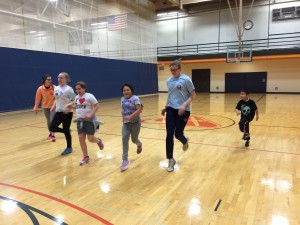
“In many ways, we are going back to basics for the kids and their families,” Morrison says of the program’s methodology. “We want to improve kids’ confidence in fundamental motor skills, and we want parents to know more about diet and healthy lifestyle habits. But more importantly, we want to expose them all to a love of lifelong activity.”
In the process, Morrison hopes of a wholesome paradigm shift, too. “When kids in the program are asked ‘why do you think you are here?’ we hope to move them away from the ‘to get skinny’ answer toward the ‘to get healthy’ answer. This is not about numbers – weight or BMI or obesity rates; this is about overall health.”
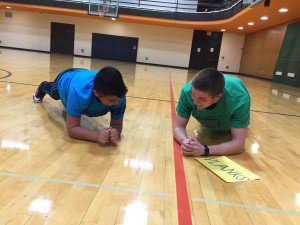
Curing the obesity epidemic is a complicated issue. It is not simply about getting kids and their parents to exercise more and eat less. It is also about a fixing a reliance on fast and processed food at home and in restaurants; about cutting back on television and other screen-based time; about a myriad of socio-economic factors that can hinder a healthy life; about an individual’s chemical make-up and genetics; about sitting down to eat a meal together instead of on-the-run; and, it’s even about childhood stress which also leads to weight gain. While kids who are obese or overweight have systemic health concerns, they are at risk for social discrimination and low self-esteem, too.
“We have a no bullying clause in Foundations of Fitness,” says Morrison. “This program is meant to be a safe place for kids to feel and to get healthy. And one other thing we teach them is that it’s okay to fail. They learn that they are supported when they succeed and even if they don’t. That is important for them to experience and to remember, especially after they leave this program.”
“We want to improve kids’ confidence in fundamental motor skills, and we want parents to know more about diet and healthy lifestyle habits. But more importantly, we want to expose them all to a love of lifelong activity.”
A dedicated room in the college’s Dow Center – painted teal-green-aqua that research has shown to be one of the three most motivational colors in the human-eye color palette – includes unique exer-gaming equipment such as a multi-player dance game and an Xbox system that requires the user to pedal a bike to keep the video game powered. More traditional equipment is there too, such as age-appropriate elliptical machines.
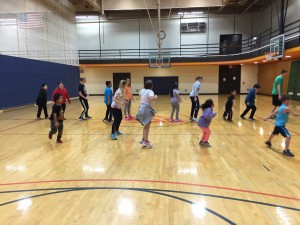
But kids being kids, full-court games are what they like most, such as Pac-Man tag, a game played along the lines on a Dow court, or, freeze tag with a twist: skipping, hopping, or galloping to tag and if caught, the kids must complete five sit-ups or push-ups before they are released back into the game.
“It has been an awesome opportunity to get to know different children and their families in our community,” says senior Jorgie Watson, an exercise science major who has been involved with the program since it started. “I love to see the improvement within the children, not only in their appearance but in their confidence and physical fitness. Many of them can’t run around the Dow track more than two laps (when they first start), but at the end, they run-walking 10 laps which is really awesome to see.”
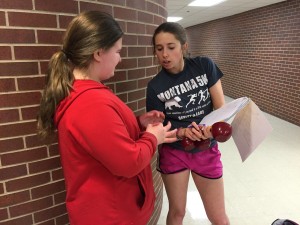
“Several of these families are receiving advice on healthy living that they would have never gotten the chance to learn otherwise,” explains junior Caitlyn Campbell, an exercise science major who plans to do graduate work in nutrition. “On top of that, the kids get an active social outlet where they feel comfortable and safe enough to exercise and learn new sports with their peers. Seeing the kids become progressively more confident with themselves is what kept me coming back to work with the program for each term. The quantitative health data we have collected further demonstrates the positive changes this program is making. But, our proudest health outcome is their increased quality of life.”
To encourage a child’s continued fitness once his or her participation in the program has ended, a four-month Dow Center membership is given to a family who attends at least eight of the 10 Foundations of Fitness sessions. Coming back to the Dow provides more activity options for the family to enjoy, like swimming, basketball, running, racquetball, and various exercise equipment. And Hope student mentors continue working with their mentees one-on-one during their Dow membership phase.
“The quantitative health data we have collected further demonstrates the positive changes this program is making. But, our proudest health outcome is their increased quality of life.”
Morrison’s vision would be to establish an even more comprehensive center for childhood enrichment to impact even more fully the wellness of the Holland area (so far close to 100 have participated in Foundations) because “we have an obligation to our community and we want to be supportive of each other. But that is a dream that is much further down the road.”
For now then, Foundations of Fitness is making a holistic, healthy difference right where it is, one young life at a time.

